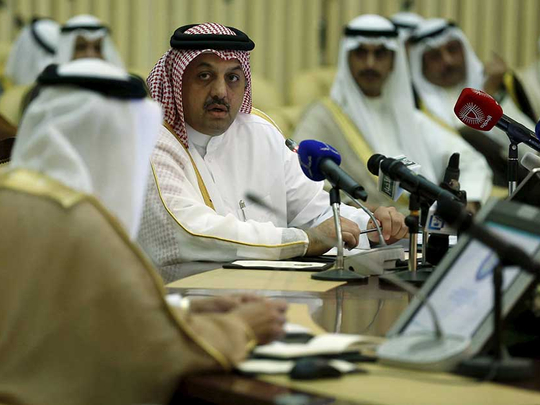
United Nations: Qatar’s foreign minister said on Monday there was general international agreement with Russia on its call to fight Daesh (the self-proclaimed Islamic State of Iraq and the Levant), but cautioned that it failed to tackle the root cause of the crisis in Syria, which was President Bashar Al Assad.
Khalid Al Attiyah also said it was time for Gulf Arab states and Iran to hold “serious dialogue” and discuss all issues to normalise ties.
“Nobody can reject Mr Putin’s call for an alliance against terrorism, but ... we need to treat the cause,” he said. “We believe strongly that the Syrian regime, namely Bashar Al Assad, is the real cause.” Qatar is among Arab countries that have joined in or supported US-led air strikes against Daesh targets in Syria. However, it has questioned the lack of action by western powers against Al Assad’s government.
“We can’t come together and say, ‘Bravo, you are our ally in fighting the terrorists which you (Al Assad) either created or brought in’,” Al Attiyah said in the interview at Qatar’s UN mission.
Although the Gulf Arab states all oppose Al Assad, Qatar has long faced criticism, for using its vast oil and gas wealth to back Islamist militants across the region, including groups in Syria.
Al Attiyah said those fighting Al Assad on the ground needed to be given more sophisticated means to tackle the government’s “barrel bombing machine”. “They need to be given the means to defend themselves,” he said. “Only then will Bashar understand he needs to come to the table, to have this political solution with him departing.” The United States admitted last week that US-trained Syrian rebels had deserted and given weapons to Al Qaida-linked groups, and Al Attiyah questioned whether the strategy of training rebels to fight Daesh rather than Al Assad was the best way forward.
“We have not treated the root of the cause. You cannot bring Syrian people and force them to go and fight Daesh only,” he said. “Their cause is not Daesh, their cause is the regime. They will fight Daesh, but they need to fight the regime first which created Daesh.” He defended Qatar’s efforts to aid Syrians fleeing the conflict in their country, responding to criticism that Gulf countries were not taking in any refugees since the conflict broke out four years ago.
He said Doha had spent some $1.6 billion in aid during that period and that since the conflict began the number of Syrians in Qatar had increased from 20,000 to 54,000.
Attiyah also said it was vital that Gulf Arab states and Iran develop a normal dialogue after Tehran had “overexaggerated” its criticism of Saudi Arabia after hundreds of people were killed during a Haj pilgrimage there last week.
Iran is involved in a number of conflicts in Arab countries — including Iraq, Syria and Yemen — to strong opposition from the Arab states. The deaths in Mina in Saudi Arabia have heightened the acrimony between Saudi Arabia and Iran.
“We need to have a serious dialogue with the Iranians. We are neighbours and can’t change the geography,” Attiyah said. “We have to discuss all issues and leave nothing behind and only then we can have a normal relation between neighbours.”











